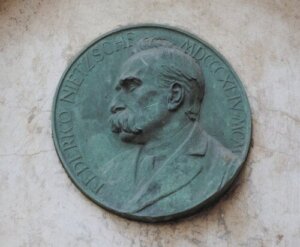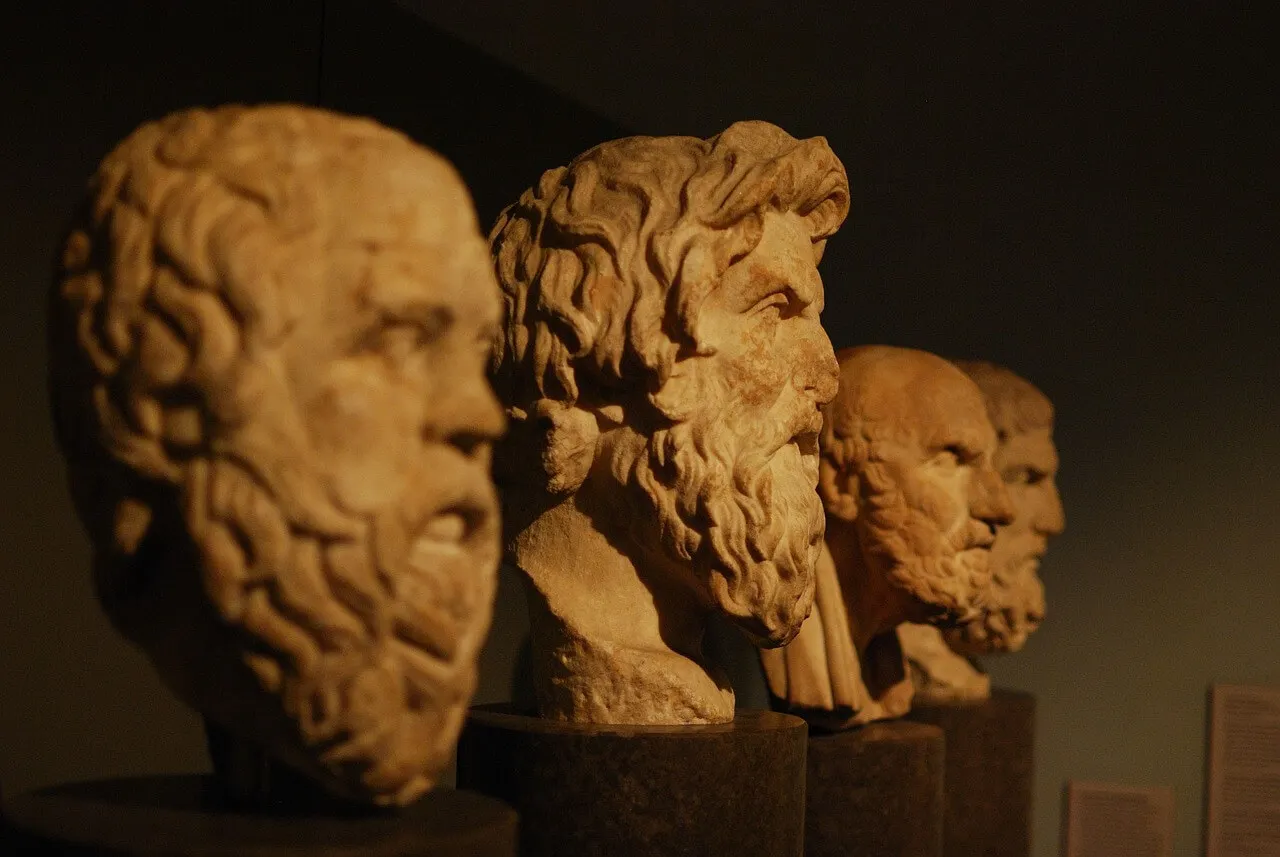Friedrich Nietzsche: History and Contributions to Philosophy

Friedrich Nietzsche was a German philosopher, poet, musician, and philologist, considered one of the most important thinkers of Western philosophy. His work exerted a profound influence on contemporary thought.
He addressed various issues and made a strong criticism of Western culture, religion, and philosophy. His subversive reflections had an impact on the 20th-century thinking of Michel Foucault, Martin Heidegger, Jacques Derrida, and Deleuze.
Brief biography of Friedrich Nietzsche
Friedrich Nietzsche was born on October 15, 1844 in Röcken (Germany). His parents were Carl Ludwig Nietzsche, a Lutheran pastor, and Franziska Oehler. He was the eldest of three siblings, these being Therese Elisabeth Alexandra (born 1846) and Ludwig Joseph (born 1848).
After the death of his father in 1849 and his younger brother in 1850, the family moved to Naumburg, where he lived with his maternal grandmother and his father’s unmarried sisters, under the protection of Bernhard Dächsel, a local magistrate.
Youth
From an early age, Friedrich Nietzsche was very studious and with a deep artistic sense. This enabled him to be admitted to the renowned Landesschule Pforta, where he continued his studies from 1858 to 1864. At that institution he received an important literary education, specializing in Greek and Roman classical texts.
After his graduation in 1864, Nietzsche began his studies in theology at the University of Bonn. However, he dropped out after one semester and began studies in philology with Professor Friedrich Wilhelm Ritschl.
In 1865 he became acquainted with the work of Arthur Schopenhauer (his greatest influence and whom he regarded as a teacher), which stimulated him to delve into philosophy. In 1869 he was appointed professor of Greek philology at the University of Basel without even having graduated, thus becoming the youngest professor at the institution.
Upon moving to Basel, Nietzsche renounced his German nationality and remained stateless for the rest of his life. However, in August 1870, he obtained a permit to serve on the Prussian side during the Franco-Prussian war, but only as a stretcher doctor, since neutral Switzerland prevented him from being drafted as a combatant.
Although he served in the militia for only one month, it was enough time to suffer the traumatic effects of the war and fall ill with diphtheria and dysentery. These conditions ruined his health.

Dementia and death
As a consequence of his illnesses, he suffered from severe visual impairment, migraines, and stomach pains. These health problems forced him to abandon his teaching career and seek milder climates, although they didn’t prevent him from continuing to write.
In 1889 he had a mental breakdown, from which he began to show signs of dementia. This condition progressed and he spent a little more than a year in a psychiatric hospital; after that time he left the hospital to be cared for at home.
On August 25, 1900, Nietzsche died of pneumonia in Weimar.
Outstanding works
Friedrich Nietzsche wrote numerous texts throughout his life. Among the most influential are the following:
- Thus Spake Zarathustra
- Beyond Good and Evil
- The Genealogy of Morals
- The Twilight of the Gods
- The Will to Power
- The Antichrist
- Ecce homo
Another great article: Learn what Albert Camus Had to Say about the Meaning of Life
Friedrich Nietzsche’s contributions to philosophy
Friedrich Nietzsche’s main contribution was the deconstruction of culture, religion, and Western philosophy, in an attempt to change their course, as he considered them to be wrong. Let’s see his reflections in detail.
Criticism of traditional values
Nietzsche defended that the traditional values of Western culture represented a “slave morality”, as they were created by weak and resentful people who encouraged behavior such as submission and conformism. According to the philosopher, the error of this morality lay in its unnaturalness, as it imposed laws and imperatives that went against the primordial instincts of life and man.
Furthermore, the aim of traditional morality is to “make man good”, despising the values of the self and establishing altruism as the supreme good. For Nietzsche, altruism is nothing more than a justification of personal decadence, in which man renounces his own life in order to live for others.
For Nietzsche, man is naturally selfish and it is good for him to be so. Therefore, traditional morality must be destroyed and a new one built, based on individual determination, autonomy and self-pride.
Do you want the good man to be modest, diligent, well-meaning and moderate? He seems to me the ideal slave.
Criticism of religion
Nietzsche also criticized religion, especially Christianity. He defended that the moral dogmas of this religious current (pacifism, tolerance, brotherly love) are nothing more than false and manipulative postulates that restrain and weaken man. Likewise, Nietzsche affirmed that religion is born of the fear and horror that man has of himself and of assuming his own destiny.
That is to say, man has a natural inclination towards power, but he fears being overwhelmed by it. So, as a pathological defense mechanism, he attributes to another being (God) a superior power.
Thus, religion alienates him, fostering “petty” values such as obedience, sacrifice or humility.
All the concepts of the church are recognized for what they are, as the most malignant superchery that exists, carried out with the aim of devaluing nature and natural values.
Criticism of traditional philosophy
Friedrich Nietzsche was also against most of the philosophers who preceded him. From Platonic idealism, Western philosophy adopted a world-denying scheme, which became Christian conceptions.
This has led to a dualistic view of things (physical world versus spiritual reality), with a primacy of the latter as the only true one, with positive values and situated somewhere beyond us. Thus, the German thinker saw metaphysics and religion as an escape reaction to life.
It cannot be denied that the most serious error that was ever committed was a dogmatic error: Plato’s invention of pure spirit and good in itself.
Nietzsche’s philosophy was based on the denial that the human being is a rational being. For him, on the contrary, irrationality is his main characteristic. Hence he rejects all previous philosophers who defended rationalism.
Another great article for you: Who Were the Sophists and What Contributions Did They Leave Us?
The Apollonian and the Dionysian
Nietzsche offers an interpretation of the world and of Greek philosophy through the distinction of two fundamental principles: Apollonian and Dionysian. The two Greek gods, Apollo and Dionysus, will be the representatives of this original interpretation.
The former is serenity, clarity, measure, and rationalism. Therefore, he is the classic image of Greece.
On the other hand, Dionysus is impulsive, excessive, overflowing, and the affirmation of life. Eroticism and orgy are the culmination of this eagerness to live. It represents the affirmation and acceptance of life in spite of all its pains.
However, Western philosophy, led by Plato and Aristotle, repressed the Dionysian approaches in order to offer an Apollonian worldview. Writing against this, Nietzsche denies the Apollonian ideals and claims the triumph of the Dionysian.
How could one be taught to despise the primordial instincts of life and invent a soul, a spirit, to outrage the body! How could one be taught to conceive the premise of life, sexuality, as something impure! How can one seek in the deepest vital necessity, in strict egoism, the principle of evil and, conversely, exalt the typical symptom of decadence, of contradiction of instincts – altruism and love of neighbor (otherism) – as the superior value!”

The Superman
According to Nietzsche, the present man, with his decadent and weak morality, is to be overcome and become a superman: a being with a new and powerful morality.
The superman will determine his own values and live according to the reality of his nature, thus possessing virtues such as strength, determination, passion, and cruelty. In this sense, he will not be accountable for his actions to anyone or anything, because he will be a leader who will decide the what, how, and when of everything that happens in his life.
Nietzsche proposed a new beginning
Friedrich Nietzsche was a philosopher who was against morality, religion, and Western philosophy, because he believed that these were enslaving humans through values that go against their nature.
For the German thinker, it was necessary to destroy what had been established thus far and build new values. Only in this way could man evolve and be free.
All cited sources were thoroughly reviewed by our team to ensure their quality, reliability, currency, and validity. The bibliography of this article was considered reliable and of academic or scientific accuracy.
- Anderson L. Friedrich Nietzsche [Internet]. California: Stanford Encyclopedia of Philosophy; 2022 [consultado el 13 de agosto de 2022]. Disponible en: https://plato.stanford.edu/entries/nietzsche/
- Wick R. Nietzsche’s Life and Works [Internet]. California: Stanford Encyclopedia of Philosophy; 2021 [consultado el 13 de agosto de 2022]. Disponible en: https://plato.stanford.edu/entries/nietzsche-life-works/
- Villamor A. Nietzsche y Así habló Zaratustra. Análisis. Revista Colombiana de Humanidades. 2019; 51(95): 465-488.
This text is provided for informational purposes only and does not replace consultation with a professional. If in doubt, consult your specialist.








